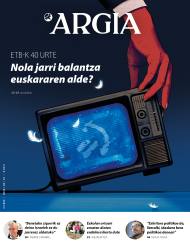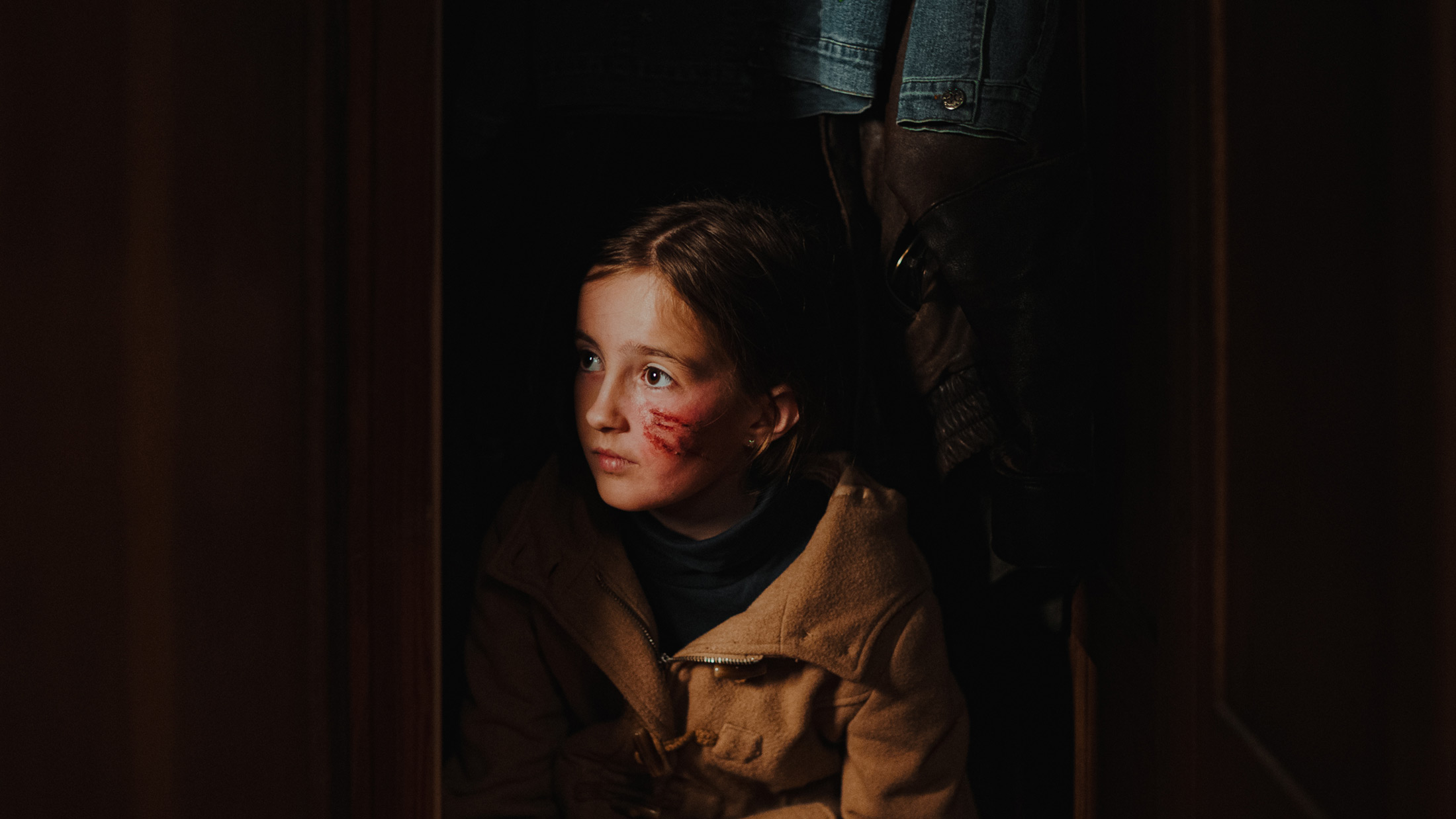Vertical axis decision indicator
- Basque television turns 40 and in 40 years everything changes: conventional television goes from being in some houses to being present in all, but nowadays television is used more to watch the audio-visual on demand, as a player, than to connect with the broadcast of the antenna. Urtzi journalist Urkizu Berria has analyzed the history of ETB and reflected on the future in the book Txoria hodei artean (Berria, Elkar and Jakin, 2024), and asked the 35 interviewees, industry experts, authorities and authorities, if we are at a crossroads in the audiovisual world, do we need television in Basque in that future?

Beyond a mere collection of opinions, the book responds to a concern that prevails in Basque society, as Urtzi Urkizu emphasized in the presentation act. In other words, the book does not analyze the 40-year trajectory of Basque television, or at least that. In this sense, he deepened the interview given to ARGIA: “I and the editors saw the need to look to the future, about the future of television in general, not only of ETB. The audiovisual world is at a crossroads, things have changed a lot in recent years and will change further in the coming years. In that future do we need television in Basque? Probably, most respondents state that television in Basque is necessary from a sociological point of view, preferably public and strong. In what window, in what format it will develop, if it will be through the Bikain platform or through which Apple glasses we will see the contents… That will be the important thing, but it is not the question to ask, the question is whether ETB wants to give priority to the contents in Basque or not”.
The core can be divided mainly into two sections: one, the activity of Basque television in the journalistic practices and in the normalization work of the Basque Country; and the other, the management of Basque television itself, the intervention of the Basque Government and the organizational model. We'll start with this second, because it's the germ of what makes and emits ETB.

In power who, the result there is sometimes not said in vain Teleberri=Telebatzoki, because the ruling party decides who leads Basque public television, and surely who can enter it. With the exception of just three years, only one party
has had authority, but the same could happen if there were any other, because the organizational and decision model allows it.
EiTB is under the control of the Basque Parliament and the Government. In the past, the director of EiTB was elected by the government, but the competition moved to Parliament to make things clearer. In practice, however, nothing changes unless the party or coalition in the government has no parliamentary majority. Once the director is elected, the same person forms his team. The intervention of the political parties does not end here: the majority of the House in Vitoria, mimetically, also passes to the Management Board.
According to Urkizu, there are two problems under the same umbrella: “On the one hand, there is no independent body from above and on the other, the Management Board has no real decision. Therefore, everything depends on the person who has chosen a part and its environment.” Question and leaves room for reflection: “How should Basque public radio television be? This debate should be in society, also among the political parties”.
Without going too far it has brought two examples, Valencian and Catalan. The Directors-General have been chosen by means of a public competition in the regional television networks of these communities. This is what EH Bildu has proposed in this legislature to extinguish, but the project did not go ahead because the PNV and the PSE-EE did not want.
The only time the PNV did not elect the CEO was from 2009 to 2013, when Patxi López was lehendakari. It was Alberto Surio's time. Urkizu recalls, among others, the articles edited by Deia: “Every day he gave EiTB a huge wood”. At the same time, it should not be forgotten that this direction made many changes, including the interruption of the Goazen phenomenon, the entertainment of children. The film premiered in January 2009 and his fame led him to prepare the series to issue it in autumn. The elections were held in March, López was appointed president and offered the first season of the series – hearing with good data – but it was not renewed. Recovered in 2016.
Speaking of the model of choice of the CEO, as many of the interviewees in the book say, the author also says, we have to change the way we act. Because there is a chance of partisanship, if not. One of the alternatives could be the creation of the Audiovisual Council, proposed by EH Bildu, which was also rejected, and even the advisor Bingen Zupiria said there are “sufficient organs”. Urkizu proposes: “It would be interesting if there were an organization made up of independent professionals and experts. My proposal goes in this direction, and also look at the whole Basque Country, not only the three territories; that the Audiovisual Council be of seven territories, worked with the College and the Government of Navarra”.
Urtzi Urkizu: "Everything depends on the person chosen by a party and its environment"
There may be a counterpoint here: EiTB is funded by the citizens of Araba, Bizkaia and Gipuzkoa. Urkizu responded to this: “They provide information from Castro, Cantabria, and La Rioja, where journalists come easily if there is an incident.” And it also gives two examples: Conquis and Atrápame if you can, two ETB2 competition programs. “Have you ever been in these programs? On the contrary, I have seen the competitors of Andalusia and Madrid and have been paid with the money of the citizens of Araba, Bizkaia and Gipuzkoa”.
There is no doubt that many references of the contests, especially in ETB2, are usually Spanish. Also informative information. However, it should be noted that the Alavese, Biscayan and Gipuzkoan parties are increasingly looking at Madrid. The dominant party certainly has to do with the public television offer, which includes the question of language policy.
The bilingual project, from its creation to its creation, represented ETB as
a bilingual project. Martin Ibarbia, Luis Mendizabal and Luis Alberto Aranberri, colleagues who were in charge of the then Amatiño working group, recall in this book that the beginning of the activity in Basque was the last order of the Basque Government. The Department of Culture of the Government wanted to make a bilingual television, but according to the Department of Linguistic Policy, the use of the two languages on the same channel could harm the Basque people.
Basque television saw the light of day on 31 December 1982. The first performances in Basque began to interact with the Spanish content to celebrate the year, until in 1986 its own Spanish-language chain was created. Then the first chain became Basque and the second became Spanish.
According to Kike Amonarriz in his book, at that time it was not a bad decision: “A chain was shielded for the Basque (...) If not, we would have one television and the presence of the Basque would be 25%. Therefore, with a single bilingual channel, the presence of the Basque would be marginal”. In the words of Amonarriz and other interviewees, the Basque chain was fruitful to promote the Basque culture, disseminate the Basque Country batua and be a reference for children and young people.
Today, above all, the “imbalance” between the two chains stands out. There are many anecdotes reported by some interviewees, in which some ETB2 programs, although similar to those of ETB1, have had more budget and work team. Elixabete Garmendia, a ETB worker for many years, remembers how she was told from the management: “For ETB1, do what you can.”
The two languages the same? Garmendia thus lived the birth of ETB2
and says what it has brought: “I did not have the threat of doing works in Spanish. But then we have seen, over the years, that informations in Spanish have prevailed, and that they have brought contempt and disaster for the Basque people. I did not think in that direction at that time, of course. Because at first the contents in Basque were more important.”
Alex Aginagalde, spokesman for the Euskaraz movement, represents another ETB2: “ETB2 could be an interim tool to bring Castilian monolinguans to the Basque language. But to do so the Basques should be free at ETB2 speaking in Basque, and fiction, series and documentaries should be broadcast in Basque, with Spanish subtitles”.
Almost 38 years have passed since the creation of ETB2 and there are voices pointing to the need to change the model of both chains. There are many who call for the closure of ETB2, or at least those who say that this chain should guarantee the normal presence of the Basque Country. Clearly, ETB management has a different view. For example, ETB Director Unai Iparragirre at ARGIA –2843. In his number 5 he said that “I do not agree with the closure of ETB2 or with the granting of fewer resources. In this country we pay all the taxes, both those who want to live in Basque and those who only know in Spanish. And I think we should also give them a service. (...) Unfortunately, in this country we are less than half of those who speak in Basque. And yet we spend half of our budget on chains in Euskera.”
ARGIA asks Urkizu about this. His opinion is clear: “I am against that. Language policy cannot act like this. Spanish public television is also received and paid by those who want to live only in Basque”. Having said that, he took the book in his hands and spread it on page 35 to seek a foreign reference that may have similarities with the Basque Country. Catalan. The philologist and professor Gerard Furest has softened his reflection on mimetic models: “TV3 is to say that Catalan is a standard language for people to have that image. TV3 cannot be a mirror of reality. In this case, it would be a mimetic model of reality. This would make the situation in Catalan worse.” To this mention, Urkizu adds in his book a quote of his own reflection: “If this is so for Catalan, what will not be, therefore, a mimetic model for Euskera”.
From the point of view of the South, of course, but the same with French, there are interviewees who think it is a mistake to put it in front. They don't think play is the right path between 50 and 50 percent, on the pretext that it's a bilingual village. “This will always harm the Basque Country,” says Urkizu, “because the language is a minority language and because there is a huge public and private offer in Spanish”. Following the line, Izaskun Rekalde, on behalf of the Apps Euskaraz movement, said that “if ETB takes both languages at the same level, the Basque will lose out in the general framework”. Lander Arretxea from the producer Hiru Damatxo also has a clear feeling: “ETB always wants to stay well with everyone”. There are many references in this regard in the book.
Elixabete Garmendia, in the book 'Txoria hodei artean', "Over the years we have observed that the informations in Spanish have been essential and have brought contempt and disaster for the Basque people"
What to offer -- most of the book's interlocutors say that in
ETB2 there are genera that are not in ETB1. For example, folded cinema is often broadcast in ETB2 and very little in ETB1. In the political debate programmes, ETB2 also has morning and evening sessions, while ETB1 only has tomorrow sessions. And in the case of humor programs, they've spent many years at ETB2 and ETB1 no.

Urkizu says it is a “great comparison” in which the balance always bets on Spanish, except in the case of sport. Especially the ball. It is a reference that internalizes people of different ages. However, Urkizu pointed out that we have to go to the base, to the bottom of ETB1, to that objective and axis of diffusion of the Basque Country and the Basque culture: “Let us not deceive ourselves, we do not believe that all those who are watching the ball or the paddle are seeing and understanding in Euskera, that they are collecting diverse wealth with the Basque culture. You can watch a ball game [Xabier] without hearing Euzkitze; [Jokin] The Upper will play the same.”
Sports broadcasts are the strength of ETB1, with the best audience data, especially balls and remers in summer. Sport is its own television program, with its presenters and journalists, with their own space, with their sponsorship. There are many sports enthusiasts in
Euskal Herria, and according to Urkizu Basque television is right about it. In another sense, sport is a reference: the dissemination of language. The expressions of the ball have been made known, the dictionary has been created, and that is a satisfaction for the Basque. The same happened at the time with Dragoi Bola, Goenkale or Wazemank, with various expressions on the street and in the children of Castilian speaking families. At present, however, Urkizu points out that nothing similar is seen.

The knowledge of the Basque country has increased, but the use does not correspond, according to all the data. Urkizu has also put on the table the investigation of Iñaki Iurrebaso. “Basque television influenced this use at the time. We should try to guess something, at least, so that young people see more in Basque and this has a positive impact on the use of language.”
... and how to offer Garmendia to Urkizu adheres to something else he says in his book: the distance to culture is very low. “ETB makes culturicide,” says Garmendia. There is
a programme, EiTB Kultura, which offers an interesting offer, but it knows perfectly well that the public of Basque television gives it to hours and without hardly any promotion.
But it's also more general. An example at hand is the voice given in the news to Urkizu's book, which serves as the basis for this report and which lasted twenty seconds. Without the statement of the author of the book. ETB only sent the camera – not to go far, in this house the same treatment is given to the ARGIA Awards. Urkizu says that we are used to them: “They send a camera on cultural issues, without a journalist, and often get into the remains of the informative, while if there is risk of flooding there are between six and eight informants.” There are exceptions to cultural issues, be it the Durango Fair or the concert of a certain musician, but they are punctual.
.jpg)
Speaking of information, Urkizu has brought up an anecdote: “A very veteran ETB journalist once told me that ETB’s news outlets have become popular Tik Tok-izan, and I’ll give you an example, because the comment came about this. At the San Sebastian Film Festival, on the same day, there was the premiere of two very powerful documentaries – Blue Folders and Gesture – both linked to historical memory, in which political representatives were invited. In the informative of that day, the presenter commented in a few seconds the two documentaries and released an impressive report about a wedding around the glamour of the Festival in San Sebastian. The creator who has been working on a documentary for six years didn't get the microphone, and the invited machine of that wedding did. It seems to me a terrifying practice, I think public television information should not go around.”
Garazi Goia, in his book 'Txoria hodei artean': 'Where should ETB arrive? Where others don't come. Euskera is the only tool to reach places where other platforms will not arrive"
Platform Bikain: Where is it? Beyond looking
back, Urkizu has looked at the presenter and the future in his book Txoria hodei artean. And you need to study the storm of digital platforms.
EiTB launched in September 2023 the Bikain platform, a free Basque content portal that aims to go beyond EiTB’s own content. All the interviewees in the book say it, even the authors: it is not easy to compete in this universe. He also joined the party late.

Garazi Goia is an expert in the audiovisual field, with important responsibilities in Sky and BBC, who currently works as a consultant with most European public television channels. He says that all public televisions have the same basic reasons: in terms of supply, there are many more opportunities and competition is very large; that trends in television consumption are changing and that changes the way content is made; and that public televisions in general are increasingly difficult to connect with young people. He says that one must also take into account the variable time and question to ask strategies: if a young man has a certain leisure time, why does he enter the Bikain platform? Basque television will have to compete in that difficult universe, “but something will have to be offered to it and reach it.” Primeran must be recognised for the good results achieved so far: EUR 20,000 from bees have had 50,000 spectators.
Urkizu would like producers like Moriarti, Txintxua Films to have to deal with Primeran and make series in Basque for ETB, but there is a problem: the budget. Urkizu says that he has a large number of workers, almost 1,200 workers, and that the structure must be maintained: “Of course, if I put all those workers to do content in Basque, it is clear that things would change.” That said, it has brought to the table the approach made by Arretxea in the book, which proposes to allocate the ETB2 budget to the elaboration of daring contents for Primera. Urkizu says more young people like Arretxea should be heard.
“A lot of work needs to be done,” says Urkizu, so that both the Bikain platform and ETB are really relevant. Certainly, ETB's are doing it. Urkizu would like to promote debates and make reflections at the local level, raise some things, such as the process of selecting the CEO, or the importance that one wants to create, double or underwrite in Basque. It will be possible to reflect with Urkizu and, with the excuse of the book, will organize book presentations and debate sessions in different places.
Mugimenduak mahai gainean jarri du euskarazko edukiak sustatzeko beharra, eta horren aurrean ETBk duen interes falta. Lehentasuna gaztelaniazko saioei ematea egotzi dio. ETB emozioen festa izan dadin, aldatu gidoia euskararen alde! lelopean, aldaketa eskatu dio telebista... [+]
The cuckoo lays its eggs in the nests of the petirreds. After laying, the cuckoo does not feed and grows to your puppy, as the robin takes care of it.
I don't know how many years of survival the cubes have. I know that the bird in our house is over 40 years old and unfortunately... [+]
Berrian lan egiten duen kazetariak, Euskal Telebistaz liburua idatzi berri du Txoria hodei artean, ETB lehen eta gero. Galdera batekin abiatzen du liburua kazetariak: 40 urte bete dituen Euskal Telebistak behar den gisan arrapostu ematen al dio euskal jendartearen egungo... [+]
The news I read a few weeks ago prompted me to address this issue: ETB3’s decision not to extend Ene Kantak’s children’s program at ETB3 surprised me and I still do not understand it, being an orderly and appropriate program.
I see very little television in recent years,... [+]
Nobody's driving? In Hego Euskal Herria, at least, it seems that the emptying of the Basque souffle does not stop at all.
What today’s children and adolescents see in Basque society is a great assimilation and little contradiction. They don't invent anything from scratch, they... [+]























